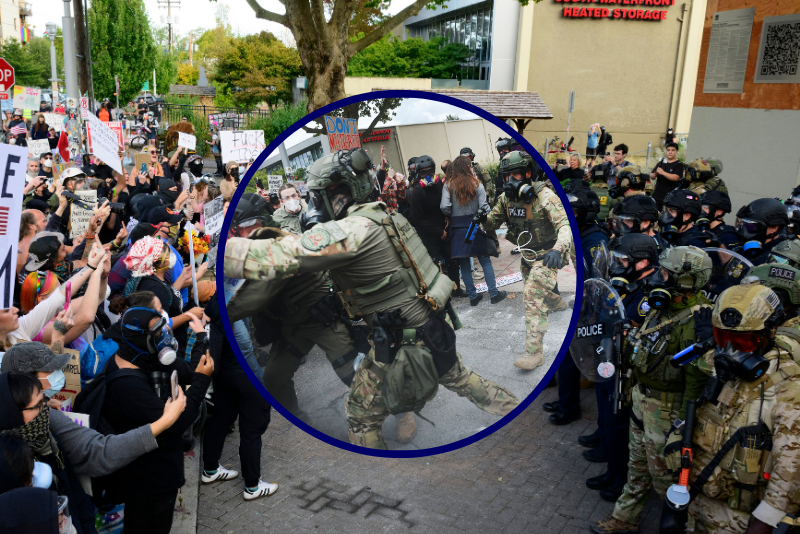
OAN Staff Brooke Mallory
12:30 PM – Tuesday, October 21, 2025
A federal appeals court cleared the way for the Trump administration to mobilize members of the Oregon National Guard for potential future deployment to Portland, reversing a lower court order that had blocked the move.
However, the actual deployment of Guard troops still remains blocked by a separate temporary restraining order (TRO), and a later trial is scheduled to begin on October 29th to address the issue.
In a 2–1 decision issued on Monday, a panel of the U.S. Court of Appeals for the Ninth Circuit granted the administration’s request to stay a temporary restraining order (TRO) that was preventing the president from federalizing Oregon’s Guard forces.
The ruling marks a preliminary but significant victory for the Trump administration — as ongoing protests and unrest by left-wing Portland residents rage on near federal immigration facilities in Portland.
Protests in Portland first erupted back in June this year as part of a broader wave of demonstrations in the state against the Trump administration’s immigration enforcement policies, particularly those led by U.S. Immigration and Customs Enforcement (ICE).
However, the focal point has been one particular federal ICE facility in South Portland — where progressive activists have gathered nightly to protest and riot.
Meanwhile on Monday, the court ruled that President Trump likely acted within his authority under 10 U.S.C. § 12406(3) — which allows the president to call National Guard units into federal service when “the president is unable with the regular forces to execute the laws of the United States.”
The ruling stated that President Trump made a justifiable determination regarding the use of regular forces alone being insufficient, adding that the court must afford due deference to that judgment. However, the ruling does not mean troops will immediately take to the Portland streets.
A separate restraining order, still in effect, halts the actual “deployment” of federalized Guard troops in Oregon until further court review.
Here are the two most likely scenarios that could unfold next, depending how the courts rule and how the Trump administration proceeds:
- If the courts ultimately side with the Trump administration — upholding the president’s authority under 10 U.S.C. § 12406(3) — the Oregon National Guard can be fully federalized and deployed in Portland. The Guard would operate under federal command, not the Oregon governor, and federal agencies like the DHS or DOJ could coordinate operations with those troops, including crowd control, securing protest zones, or responding to unrest.
- If the courts later determine that the president overstepped his authority, they could reinstate or extend the restraining orders, blocking both federalization and deployment. The Oregon National Guard would remain under state control and the federal government would have to rely solely on civilian federal law enforcement like U.S. Marshals and the Federal Protective Service to protect federal property.
Oregon officials like Democrat Governor Tina Kotek and Attorney General Dan Rayfield have vowed to continue their legal fight against Trump, arguing that the GOP president’s order is a grave overreach into state sovereignty. State officials also claim that the conditions cited by the administration, protests near the Lindquist Federal Building and ongoing fighting with law enforcement, does not rise to the level that would justify federal intervention.
The two judges in the majority argued that courts must be cautious not to second-guess executive judgments involving national defense and internal security. The panel also emphasized that its ruling was procedural, not a final decision on the merits.
The legal battle stems from a September 28th presidential order authorizing up to 200 Oregon National Guard members to be federalized for 60 days to protect federal personnel and property.
Civil rights groups and Portland city officials have since condemned the decision as an attempt to suppress political dissent. The Justice Department, however, has maintained that federal deployment is necessary to restore order and safeguard federal operations — citing repeated vandalism, assaults on agents, and the temporary closure of federal offices.
Monday’s ruling allows the federal government to proceed with preparations to place the Oregon Guard under federal command, though the actual deployment remains blocked pending further litigation. The Ninth Circuit could rehear the case en banc (on the bench), and legal experts say the dispute could eventually reach the U.S. Supreme Court.
A trial is scheduled to begin on October 29th to further address the legal challenges surrounding the deployment of the Oregon National Guard.
Stay informed! Receive breaking news alerts directly to your inbox for free. Subscribe here. https://www.oann.com/alerts
What do YOU think? Click here to jump to the comments!
Sponsored Content Below

